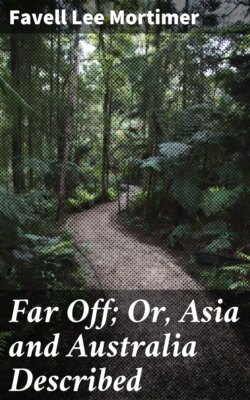Читать книгу Far Off; Or, Asia and Australia Described - Favell Lee Mortimer - Страница 16
На сайте Литреса книга снята с продажи.
ARMENIA.
ОглавлениеTable of Contents
One corner of Turkey in Asia is called Armenia. There are many high mountains in Armenia, and one of them you would like to see very much. It is the mountain on which Noah's ark rested after the flood. I mean Ararat.[4]
It is a very high mountain with two peaks; and its highest peak is always covered with snow. People say that no one ever climbed to the top of that peak. I should think Noah's ark rested on a lower part of the mountain between the two peaks, for it would have been very cold for Noah's family on the snow-covered peak, and it would have been very difficult for them to get down. How pleasant it must be to stand on the side of Ararat, and to think, "Here my great father Noah stood, and my great mother, Noah's wife; here they saw the earth in all its greenness, just washed with the waters of the flood, and here they rejoiced and praised God."
I am glad to say that all the Armenians are not Mahomedans. Many are Christians, but, alas! they know very little about Christ except his name. I will tell you a short anecdote to show how ignorant they are.
Once a traveller went to see an old church in Armenia called the Church of Forty Steps, because there are forty steps to reach it: for it is built on the steep banks of a river.
The traveller found the churchyard full of boys. This churchyard was their school-room. And what were their books? The grave-stones that lay flat upon the ground. Four priests were teaching the boys. These priests wore black turbans; while Turkish Imams wear white turbans. One of these Armenian priests led the traveller to an upper room, telling him he had something very wonderful to show him. What could it be? The priest went to a nacho in the wall and took out of it a bundle; then untied a silk handkerchief, and then another, and then another; till he had untied twenty-five silk handkerchiefs. What was the precious thing so carefully wrapped up? It was a New Testament.
It is a precious book indeed: but it ought to be read, and not wrapped up. The priest praised it, saying, "This is a wonderful book; it has often been laid upon sick persons, and has cured them." Then a poor old man, bent and tottering, pressed forward to kiss the book, and to rub his heavy head. This was worshipping the book, instead of Him who wrote it.
An Armenian village looks like a number of molehills: for the dwellings are holes dug in the ground with low stone walls round the holes; the roof is made of branches of trees and heaps of earth. There are generally two rooms in the hole—one for the family, and one for the cattle.
A traveller arrived one evening at such a village; and he was pleased to see fruit-trees overshadowing the hovels, and women, without veils, spinning cotton under their shadow. But he was not pleased with the room where he was to sleep. The way lay through a long dark passage under ground; and the room was filled with cattle: there was no window nor chimney. How dark and hot it was! Yet it was too damp to sleep out of doors, because a large lake was near; therefore he wrapped his cloak around him, and lay upon the ground; but he could not sleep because of the stinging of insects, and the trampling of cattle: and glad he was in the morning to breathe again the fresh air.
Rich Armenians have fine houses. Once a traveller dined with a rich Armenian. The dinner was served up in a tray, and placed on a low stool, while the company sat on the ground. One dish after another was served up till the traveller was tired of tasting them. But there was not only too much to eat; there was also too much to drink. Rakee, a kind of brandy, was handed about; and afterwards a musician came in and played and sang to amuse the company. In Turkey there is neither playing, nor singing, nor drinking spirits. The Turks think themselves much better than Christians. "For," say they, "we drink less and pray more." They do not know that real Christians are not fond of drinking, and are fond of praying; only they pray more in secret, and the Turks more in public.
